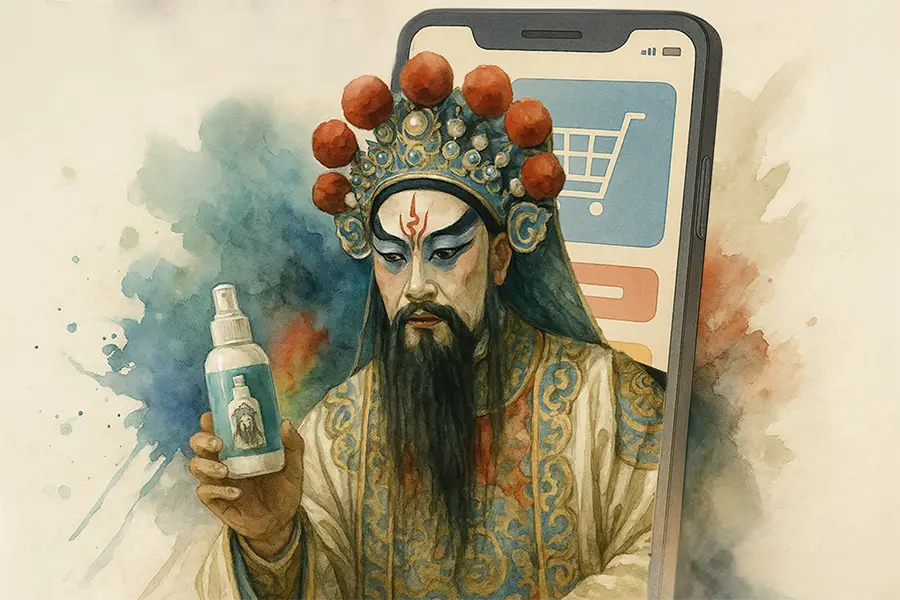How e-commerce short dramas get you to spend – without realizing it

The storytelling revolution of short, three-minute dramas on e-commerce platforms has seamlessly merged ‘watching’ and ‘shopping’
By Lee Shih Ta
“She wore shabby clothes and was dumped by her boyfriend. But she was determined to turn her life around and looked stunning as she made an amazing comeback at his wedding three months later.”
If this storyline sounds familiar, congratulations — you’ve become a regular in the universe of storytelling content on e-commerce.
Over the past two years, a growing number of e-commerce platforms have launched “short drama” sections, investing real capital to support creators. By integrating products into plots, they allow users to “watch and shop” simultaneously — often making purchases without realizing it. What began as a marketing gimmick has evolved into a structural shift in how attention and consumption decisions are captured.
Driving this shift is the explosive rise of Douyin E-commerce, the Chinese version of TikTok. In 2024, Douyin’s annual GMV exceeded 3.5 trillion yuan ($486.4 billion), making it China’s third-largest e-commerce platform. It proved that content-driven commerce — “video-based seeding + livestream conversion” — can disrupt the traditional “search–compare–checkout” model. Traditional platforms realized that relying solely on static listings and text might soon render them invisible.
Short dramas have a natural stickiness: each episode runs about three minutes, with melodramatic plots, extreme characters and exaggerated twists. More importantly, short drama marketing goes beyond embedded ads — brands can custom-produce episodes, integrate with livestreams, and use the platform’s algorithms to track user preferences during viewing.
That’s why e-commerce platforms are now producing dramas themselves.
Alibaba (BABA.US; 9988.HK) launched “Guangguang Theater” on Taobao at the end of 2023, focusing on co-branded dramas and merchant-involved scriptwriting, integrating with Taobao Live and product pages to enable “watch and buy” functionality. Douyin pushed its “drama + shopping” model in the second half of 2023, embedding shopping carts and character-based shops. Meanwhile, PDD Holdings (PDD.US) added a short drama section to its “Duoduo Video” in April 2024, focusing on low-cost “good value dramas” for smaller, less-affluent cities. This deep fusion of storytelling and commerce is redefining the shopping experience.
Different genres, different products
Different genres of drama often pair with specific products. The “revenge glow-up” narrative —where a protagonist undergoes a striking transformation after being mocked or underestimated — is particularly effective for promoting fashion, beauty products, and self-improvement services such as online courses. “Emotional family dramas,” involving marital or household conflict, are suited for home goods, kitchenware, and seasonal gifts. Meanwhile, “twist and reconciliation” storylines, which build emotional tension before ending on a heartfelt note, are ideal for enhancing the sentimental value of accessories, keepsakes, or romantic gifts.
While these storylines seem repetitive, they’re highly efficient. The goal of short dramas isn’t originality, but familiarity and rhythm. Viewers don’t need to understand backstories — they just need to expect revenge, redemption, or tears. This is when platforms guide users toward purchases, creating a golden moment for brand conversion.
Meanwhile, an increasing number of drama clips are being repurposed and distributed across content platforms like Douyin and RedNote. E-commerce platforms have become content producers, while content platforms act as amplifiers and distributors.
Don’t underestimate the impact of these short dramas. According to the “China Internet Audio-Visual Development Research Report (2025),” the micro-drama market was worth 50.44 billion yuan in 2024, surpassing China’s total box office revenue of 42.5 billion yuan. The micro-drama market is expected to reach 100 billion yuan by 2027.
However, this content-commerce experiment isn’t without its risks and challenges.
First, there’s content fatigue. Over-reliance on formulaic plots may eventually bore viewers, leading to user loss despite short-term success. Second, brand identity is often diluted — viewers remember the drama, not necessarily the brand, making long-term loyalty hard to build. Third, cross-platform conversion is hard to track. Even if a drama goes viral, platforms and merchants often lack visibility into how much traffic gets converted, and where.
But these challenges don’t spell the end of the short drama e-commerce model. To the contrary, they may be paving the way for an entirely new form of content-driven commerce — one that builds a multi-layered ecosystem with content at its core. Viewers binge-watch short dramas while shopping, and platforms continuously iterate to find stories that make people emotionally — and financially — invest.
In a way, e-commerce is starting to look like a drama that never ends.
Lee Shih Ta is an editor at Bamboo Works.
You can contact him at shihtalee@thebambooworks.com
To subscribe to Bamboo Works weekly free newsletter, click here





